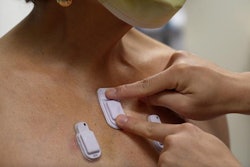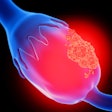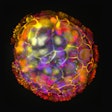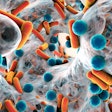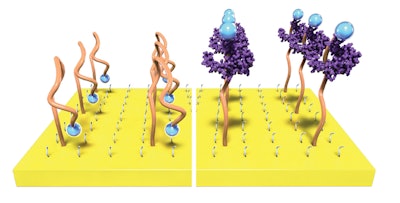
Northwestern University researchers are developing technology that may make it easier to eavesdrop on the body’s inner conversations, including molecular signals that arise from health issues.
The research, published recently in Nature Communications, could facilitate the detection of these faint signals in real time.
According to the researchers, the work could one day enable faster recognition of health problems and better monitoring of disease progression.
Some electrochemical biosensors use aptamers -- single strands of DNA that bind to a specific target, then fold into a new structure that triggers an electrochemical signal. But these signals are often weak and susceptible to distortion. Chemical sensors communicate vital information but also yield weak signals, and healthcare professionals must run a blood, sweat, or saliva sample through high-tech laboratory equipment to decipher these signals, delaying results.
The Northwestern University team sought instead to sense and amplify hidden signals without the signals ever leaving the body.
The team developed an electrochemical transistor-based sensor with an amplifying component to sense and boost weak biochemical signals. The device’s electrode senses the signal, while the nearby transistor amplifies it. The researchers also incorporated a built-in, thin-film reference electrode to make the amplified signals more stable and reliable. Combining the transistor’s power of amplification with the referencing from established electrochemical methods provided what the researchers deemed “the best of both worlds” -- enabling them to accurately measure the aptamer binding and amplify it on site.
For validation, the team turned to a common cytokine -- a type of signaling protein that regulates immune response and is implicated in tissue repair and regeneration. By measuring cytokine concentration near a wound, researchers could assess how quickly a wound is healing, if there is a new infection, or whether other medical interventions are required. The team experimentally amplified the cytokines’ signal by up to four orders of magnitude, compared with traditional electrode-based aptamer sensing methods.
The study researchers believe the technology may be able to amplify signals from molecules other than cytokines, including antibodies, hormones, or drugs. The transistors’ ability to boost faint chemical signals by 1,000 times can make these molecules easier to detect.
According to the researchers, amplifying the weak biochemical signals may bring clinicians closer to real-time, on-site diagnostics and disease monitoring. Reliable detection and measurement of biochemical signals could potentially translate into incorporating those sensors into inexpensive devices that could be worn on the body to indicate how an injury is healing, whether a cancer treatment is working, or a virus invasion.
“This approach is broadly applicable and doesn’t have a specific use case,” senior author Jonathan Rivnay, professor of biomedical engineering at Northwestern, said in a statement. “The big vision is to implement our concept into implantable biosensors or wearable devices that can both sense a problem and then respond to it.”





